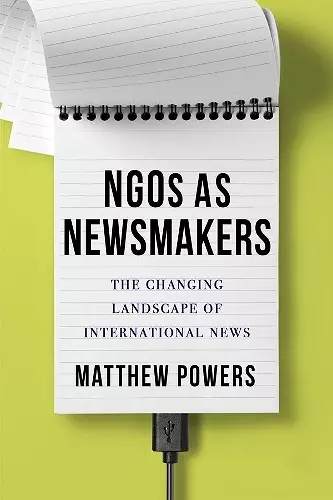NGOs as Newsmakers
The Changing Landscape of International News
Format:Hardback
Publisher:Columbia University Press
Published:5th Jun '18
Currently unavailable, and unfortunately no date known when it will be back

As traditional news outlets’ international coverage has waned, several prominent nongovernmental organizations have taken on a growing number of seemingly journalistic functions. Groups such as Amnesty International, Human Rights Watch, and Médecins Sans Frontières send reporters to gather information and provide analysis and assign photographers and videographers to boost the visibility of their work. Digital technologies and social media have increased the potential for NGOs to communicate directly with the public, bypassing traditional gatekeepers. But have these efforts changed and expanded traditional news practices and coverage—and are there consequences to blurring the lines between reporting and advocacy?
In NGOs as Newsmakers, Matthew Powers analyzes the growing role NGOs play in shaping—and sometimes directly producing—international news. Drawing on interviews, observations, and content analysis, he charts the dramatic growth in NGO news-making efforts, examines whether these efforts increase the organizations' chances of garnering news coverage, and analyzes the effects of digital technologies on publicity strategies. Although the contemporary media environment offers NGOs greater opportunities to shape the news, Powers finds, it also subjects them to news-media norms. While advocacy groups can and do provide coverage of otherwise ignored places and topics, they are still dependent on traditional media and political elites and influenced by the expectations of donors, officials, journalists, and NGOs themselves. Through an unprecedented glimpse into NGOs’ newsmaking efforts, Powers portrays the possibilities and limits of NGOs as newsmakers amid the transformations of international news, with important implications for the intersections of journalism and advocacy.
Powers provides a rich analysis of the role of NGOs in shaping international news, taking a useful institutional—“on-the-ground”—perspective to supplement the more celebratory analysis by many communication scholars of digitally enabled social movements, including the Arab Spring and related online phenomena. -- Stephen Reese, University of Texas, Austin
Powers offers a sharp dissection and a comprehensive analysis of the news-making strategies of global NGOs. Grounded in smart interpretations of institutional theories, the book shows the ambiguities of NGOs as news makers - the innovations as well as the limitations to broaden the content of regular news cycles. The cases discussed amply demonstrate that NGOs make decisions in fields of news shaped by multiple factors. Powers convincingly argues that NGOs do not make news as they please, but they do so under institutional circumstances existing already in a world saturated with information. -- Silvio Waisbord, George Washington University
Matthew Powers' NGOs as Newsmakers combines rich empirical observation, gained through interviews and field work at the Syrian-Turkish border, with sophisticated causal analysis. He compellingly shows how the dwindling resources for international coverage on the one hand and humanitarian NGOs' move toward newsmaking on the other reinforce rather than sideline professional news norms. A must read for anybody interested in the fate of cosmopolitan journalism and humanitarian aid. -- Hartmut Wessler, University of Mannheim
Powers has produced a landmark study of one of the complex high-stakes dynamics shaping the future of journalism. NGOs as Newsmakers is a work of theoretical nuance and empirical rigor that spotlights the ways NGOs are fueling important and original reporting while also nourishing stereotypes and power dynamics inherent to traditional news practices that have hemmed in reporting. -- Adrienne Russell, University of Washington
Scholars, editors, journalists, NGO practitioners, and policy experts would benefit from reading NGOs as Newsmakers to better understand the current state of affairs between NGOs and newsmakers. In particular, by applying the field variant of institutional theory to illuminate how journalists and NGOs vie for attention in an age of information overload. -- Allison J. Steinke, University of Minnesota-Twin Cities * Digital Journalism *
- Winner of Journalism Studies Division Book Award, International Communication Association 2019
ISBN: 9780231184922
Dimensions: unknown
Weight: unknown
240 pages